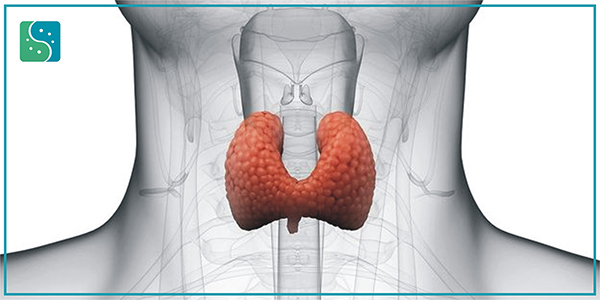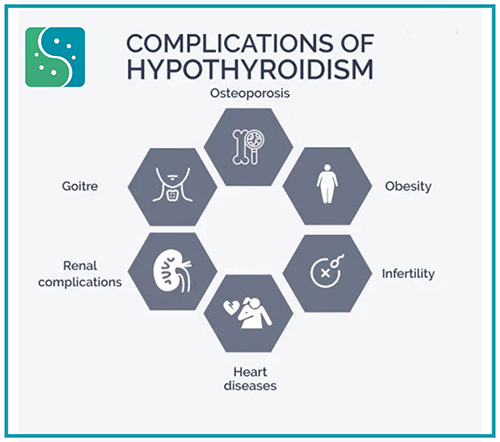HYPOTHYROIDISM is a disorder of endocrine system in which thyroid gland does not produce enough hormone. Hypothyroidism is a condition in which the body lacks sufficient thyroid hormone. Since the main purpose of thyroid hormone is to “run the body’s metabolism”, it is understandable that people with this condition will have symptoms associated with a slow metabolism.
Homoeopathy is one of the most popular holistic systems of medicine. The selection of homoeopathic medicine for hypothyroidism is based upon the theory of individualization and symptoms similarity by using holistic approach.
Homoeopathic treatment works in early cases of underactive thyroid. Fundamentally, it has to be understood that homoeopathic treatment aims at stimulating the thyroid gland to produce its own thyroid hormones. External supply of the hormone is not the treatment but an arrangement. Homoeopathic medicines try to correct the internal imbalance. This is possible in many cases if not all. If achieved successfully, the lifelong need for thyroid supplement may not be required.
If a patient is already taking conventional medicine for hypothyroidism, homoeopathy can be used in conjunction with it without interfering with the medication’s effectiveness. As the thyroid hormones gradually return to normal levels, the conventional medication can be gradually tapered off (with guidance from a doctor) while continuing with homoeopathy to prevent a recurrence.
The thyroid gland is a small, butterfly-shaped organ located in the front of your neck just under the voice box (larynx). Picture the middle of the butterfly’s body centered on your neck, with the wings hugging around your windpipe (trachea). The main job of the thyroid is to control your metabolism. Metabolism is the process that your body uses to transform food to energy your body uses to function. The thyroid creates the hormones T4 and T3 to control your metabolism. These hormones work throughout the body to tell the bodies cells how much energy to use. They control your body temperature and heart rate.

When your thyroid works correctly, it’s constantly making hormones, releasing them and then making new hormones to replace what’s been used. This keeps your metabolism functioning and all of your body’s systems in check. The amount of thyroid hormones in the bloodstream is controlled by the pituitary gland, which is located in the center of the skull below the brain. When the pituitary gland senses either a lack of thyroid hormone or too much, it adjusts its own hormone (thyroid stimulating hormone, or TSH) and sends it to the thyroid to balance out the amounts.
If the amount of thyroid hormones is too high (hyperthyroidism) or too low (hypothyroidism), the entire body is impacted.
Hypothyroidism happens when the thyroid gland doesn't make enough hormones. Conditions or problems that can lead to hypothyroidism include.
The symptoms of hypothyroidism usually develop slowly over time, sometimes years. They can include:
Although anyone can develop hypothyroidism, you're at an increased risk if you.

Hypothyroidism that isn't treated can lead to other health problems, including.
The main way to diagnose hypothyroidism is a blood test called the thyroid stimulating hormone (TSH) test. Your doctor may also order blood tests for conditions like Hashimoto’s disease. If the thyroid is enlarged, the doctor may be able to feel it during a physical exam during an appointment.
In hypothyroidism, the thyroid doesn’t make enough thyroid hormone.
The difference between hypothyroidism and hyperthyroidism is quantity. In hypothyroidism, the thyroid makes very little thyroid hormone. On the flip side, someone with hyperthyroidism has a thyroid that makes too much thyroid hormone. Hyperthyroidism involves higher levels of thyroid hormones, which makes your metabolism speed up. If you have hypothyroidism, your metabolism slows down.
In most cases, women with hypothyroidism during pregnancy have Hashimoto’s disease. This autoimmune disease causes the body’s immune system to attack and damage the thyroid. When that happens, the thyroid can’t produce and release high enough levels of thyroid hormones, impacting the entire body.
In some cases, there can be a connection between untreated hypothyroidism and erectile dysfunction. When your hypothyroidism is caused by an issue with the pituitary gland, you can also have low testosterone levels. Treating hypothyroidism can often help with erectile dysfunction if it was directly caused by the hormone imbalance.
If your hypothyroidism is not treated, you could gain weight. Once you are treating the condition, the weight should start to lower. However, you will still need to watch your calories and exercise to lose weight.
Iodine is a mineral that helps your thyroid produce hormones. One idea is that if you have low levels of thyroid hormone, eating foods rich in iodine could help increase your hormone levels. Foods that are high in iodine include eggs, dairy products, meat, poultry, seafood, edible seaweed, iodized salt etc.
People with thyroid condition should not consume large amounts of iodine because the effect may be paradoxical (self-contradictory).
Hypothyroidism can make your metabolism slow down resulting in number of symptoms like gaining weight, bone pains, memory weakness, menstrual irregularities, infertility, depression etc. Homoeopathy is strongly recommended to treat hypothyroidism. Homoeopathic treatment aims at stimulating the thyroid gland to produce its own thyroid hormones. External supply of the hormone is not the treatment but an arrangement. Homoeopathic medicines try to correct the internal imbalance. The aim of homoeopathy is not only to treat the disease condition but to address its underlying cause and individual susceptibility. This can be achieved through individualized remedy selection and treatment, the patient should consult a qualified homoeopathic doctor in person.